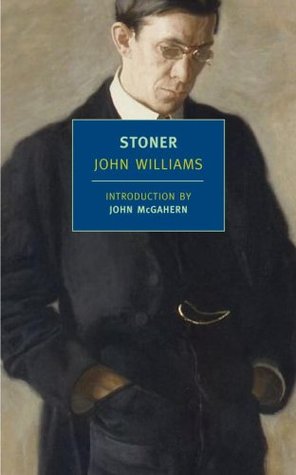Stoner
Lust and learning. That's really all there is, isn't it?
I'm a bit stymied about writing a review for Stoner because, as promised, it's pretty much a perfect novel. So many little masterful moments were created here by author John Williams, and their truth touched me, and I was repeatedly wiping away tears of recognition, and the last thing I want to do is to summarise the plot. For my own purposes, I can only try to memorialise why this book left me gutted; I have no illusions that this review will be of use or interest to anyone else. But do yourself a favour: read Stoner.
Sometimes, in his attic room at night, he would look up from a book he was reading and gaze in the dark corners of his room, where the lamplight flickered against the shadows. If he stared long and intently, the darkness gathered into a light, which took the insubstantial shape of what he had been reading. And he would feel that he was out of time, as he had felt that day in class when Archer Sloane had spoken to him. The past gathered out of the darkness where it stayed, and the dead raised themselves to live before him; and the past and the dead flowed into the present among the alive, so that he had for an intense instant a vision of denseness into which he was compacted and from which he could not escape, and had no wish to escape.
That was the first passage that brought me to tears, and not because it's particularly touching or emotional; I simply saw myself in it. As I've written here before, I was in my late twenties before I really “discovered” literature as a vehicle for truth, and Stoner's “vision of denseness” – of which he recognised himself to be a part – was exactly my own experience. Just as Sloane points out to Stoner, I, too, had fallen in love.
The love of literature, of language, of the mystery of the mind and heart showing themselves in the minute, strange, and unexpected combinations of letters and words, in the blackest and coldest print – the love which he had hidden as if it were illicit and dangerous, he began to display, tentatively at first, and then boldly, and then proudly.
Related to my “discovery” of literature, it took me at least another ten years to have the same experience – that feeling of unification with rather than rote memorisation of – history. All through school I had found the study of both Literature and History to be dull and onerous and it took decades for me to realise that neither is a subject outside of myself; that I have a unique place and an active role in the continuation of each; in the continuing story of humanity. And I believe that I had good teachers who were passionate about what they taught, but I learned nothing about the truth of either Literature or History until I was ready for it. So watching Stoner become a professor – watching him discover the beauty of truth and the desire to pass that torch to the next generation – was fascinating to me (as someone who wasn't prepared to become a torchbearer during my own unremarkable University days, I could certainly identify with his half-hearted students); and then to watch Stoner's light be dimmed by unhappiness at home and petty bureaucracy at work was to watch the slow martyrdom of a saint (and it was redemptive to watch him continue his reading and research into the past for the pure delight of discovery).
He had, in odd ways, given it to every moment of his life, and had perhaps given it most fully when he was unaware of his giving. It was a passion neither of the mind nor of the flesh; rather, it was a force that comprehended them both, as if they were but the matter of love, its specific substance. To a woman or to a poem, it said simply: Look! I am alive.
And isn't Look! I am alive the point of everything? Stoner is the story of an entire life, so briefly and compactly and brilliantly told, and from the awkward exchanges he had with his simple parents and inscrutable wife, to his unflagging commitment to his work and failed grasps at human connection, nothing about his story is my story, and yet...with moments of truth on every page (I had flagged three times as many passages as I ended up using), Stoner's story is the story of all of us; one more flawed and beautiful being adding a passage to the continuing story of humanity; I felt perfectly connected. And no wonder I feel so impatient with most of the novels I read: How is it that the vast majority of authors don't get that this is the point of everything?

